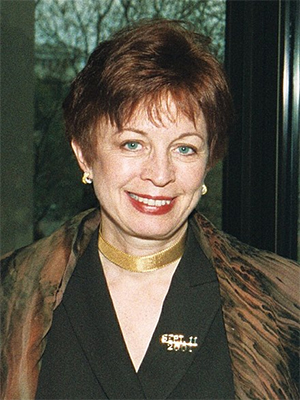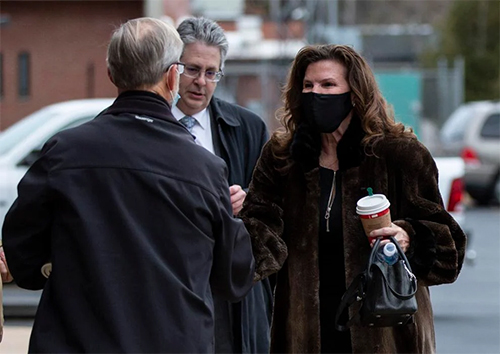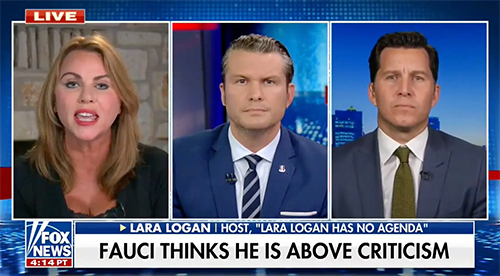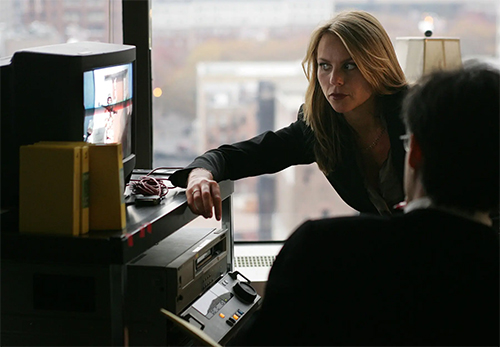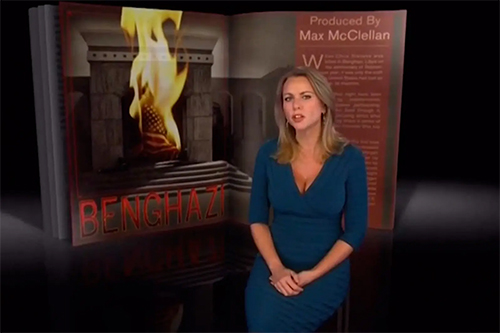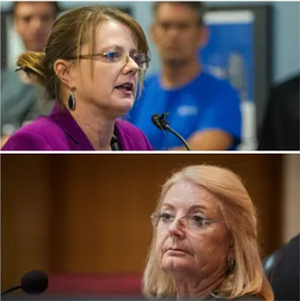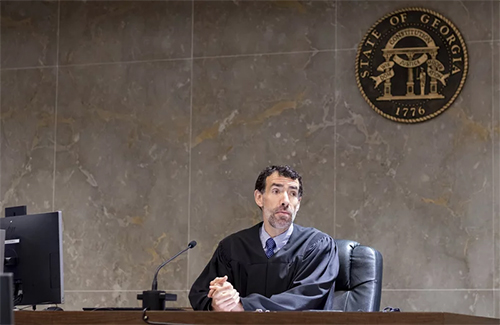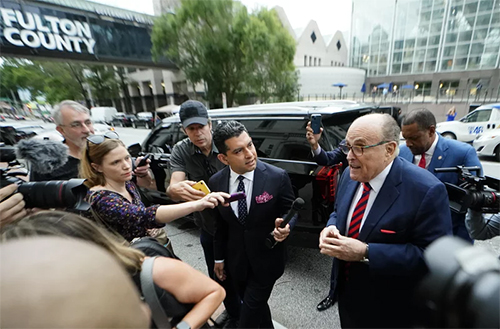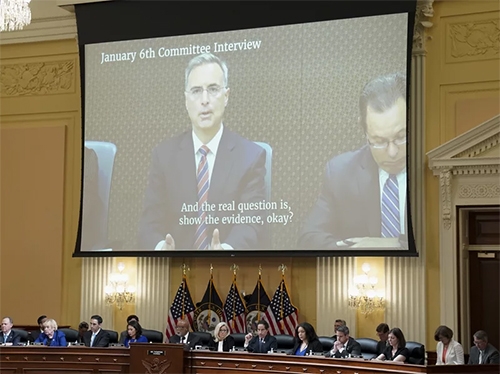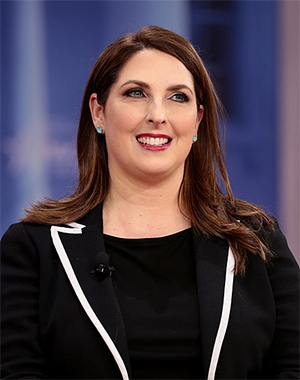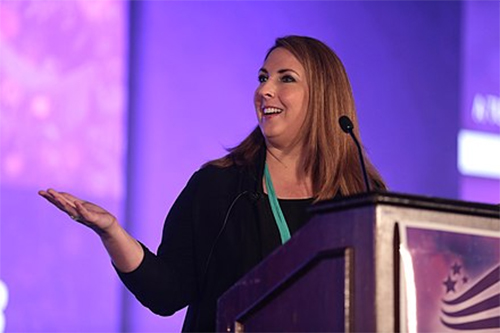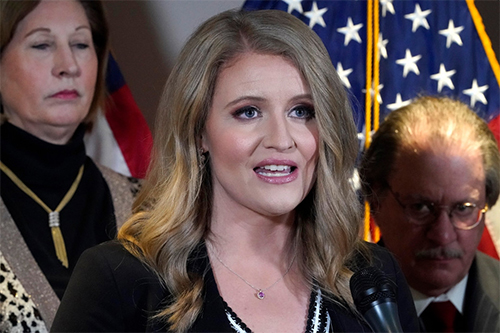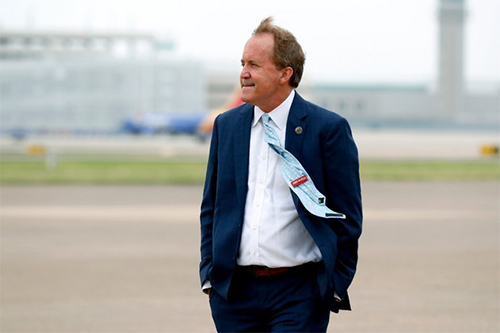by Ben Meiselas
MeidasTouch
Jul 3, 2023
MeidasTouch host Ben Meiselas discusses the latest Washington Post report that Donald Trump threatened the former Arizona Governor Doug Ducey after the 2020 election. Calling Jack Smith!
Transcript
I'm Ben Meiselas from the Meidas touch
Network we know that last week's special
counsel Jack Smith and his team took a
trip to Atlanta and met with the
secretary of state of Georgia Brad
raffensberger Brad raffensberger
Republican Secretary of State of Georgia
received the phone call from Donald
Trump after the 2020 election Brad I
need you to find me 11,780
votes to overturn the results of the
election in Georgia or else Brad bad
things are going to happen to you Brad
raffensberger and his team were
recording that phone call because they
know they were being extorted by Donald
Trump Donald Trump says that was a
perfect phone call nobody was yelling at
him on the phone call that's how he
knows it was perfect nobody was throwing
ketchup so that's also why he thinks it
was perfect and he claims that the only
crime that was committed was that he was
being recorded without his consent of
course Donald Trump is a liar and a
criminal and every single thing he says
is completely and utterly preposterous
and false and just propaganda to his
base who evidently do not care about the
facts and reality but Donald Trump's
calls to Brad raffensberger many legal
observers including myself believe it
was criminal well
um uh special counsel Jack Smith's not
just stopping when it comes to Brad
raffensberger special counsel Jack Smith
may also be focused on other threats
that we haven't necessarily been focused
on here and the Washington Post is
reporting for example that Donald Trump
was not just pressuring Brad
raffensberger they shouldn't come as a
surprise though because we know Trump
was press pressuring lots of officials
but Trump was also pressuring Arizona
governor Doug Ducey to overturn the
results in Arizona the results of the
2020 election a new exclusive Washington
Post report that broke this weekend says
Trump pressured Arizona governor Doug
Ducey to overturn the 2020 election
results in a phone call in late 2020
Donald Trump tried to pressure Arizona
governor Doug Ducey to overturn the
state's presidential election results
saying that if enough fraudulent votes
could be found it would overcome Trump's
loss in Arizona three people familiar
with the matter talked to Washington
Post for this article Trump also
reportedly spoke with uh Pence and told
Pence to basically put pressure on Ducey
Pence called Ducey multiple times but
did not do any of the things that Donald
Trump said that he should do to do see
that is important as well because you
will recall that former vice president
Pence has testified before special
counsel Jack Smith and all of that
special counsel Jack Smith has now
learned so all of the individuals
whether it was Doug Ducey or other
people that Trump was getting Pence to
try to call and threaten special counsel
Jack Smith has that information and
Pence according to the sources in this
article never carried out Donald Trump's
wishes because doesn't say this in the
article but let me fill in the because
Pence knew it was Criminal
so clearly when Jack Smith had former
vice president Pence before a grand jury
he would have asked pencil name me all
of the times Donald Trump told you to
call people why didn't you say the
things that Donald Trump wanted you to
say oh because it was a crime the
article goes on to say that the extent
of Trump's efforts to they use the word
control I'll use the word threaten Ducey
into helping him stay in power has not
yet been reported The Washington Post
reported on it first even though other
efforts by Donald Trump uh and Trump's
lawyers threatening other Arizona
officials has been reported as well
according to people who heard about
these stories from Ducey Ducey described
the pressure he was under after Trump's
loss to numerous people the account was
confirmed by others aware of the call
Ducey told the donor he was surprised
that special counsel Jack Smith's team
had not inquired about his phone call
with Trump and Pence as part of the
Justice Department's investigation into
former president Trump's attempt to
overturn the 2020 election well the
reality is though is that it should have
come as a surprise you now know what the
Midas touch Network why Jack Smith has
the info he has the info from the other
people that he's spoken to and that's
what Jack Smith is
nailing down.
the article says that Ducey did not
record the phone call the way Brad
raffensberger uh recorded the phone call
now at a public office it says Ducey
declined through a spokesperson to
answer specific questions about his
interactions quote this is neither new
nor is it news to anyone following the
issue the last two years spokesman
Daniel scarpinato said in a statement
Governor Ducey defend the results of
Arizona's 2020 election he certified the
election and he made it clear that the
certification provided a trigger for
credible complaints backed by evidence
to be brought forward none were ever
brought forward the government stands by
his action to certify the election and
consider the issue to be in the rear
view mirror
uh the article then goes on to cite a
trump spokesperson who just says oh it's
a Witch Hunt it's a Witch Hunt it's a
Witch Hunt the article goes on to say
it's unclear if Ducey has been contacted
by Smith's office since meeting with
this donor it is unclear if prosecutors
plan to eventually bring charges or how
the calls figure into their
investigation prosecutors have shown
interest into Trump's efforts to
conscript Pence into helping him
according to Witnesses and and subpoenas
previously reviewed by The Washington
Post the article goes on to say how
Trump phoned the governor's cell phone
on November 30th 2020 as Ducey was in
the middle of signing documents certify
you remember this certifying Biden's win
in this state during a live stream video
ceremony Trump's Outreach was
immediately clear to those watching
because Governor ducey's phone as he was
certifying Biden he had the ringtone set
to hell to the chief playing on his
phone Ducey pulled out his phone from
his suit jacket muted the incoming call
and put his phone aside as he was
signing the certification saying that
Biden won that's when Trump was calling
him as the certification was being
signed the article goes on to say four
people familiar with the call said Trump
spoke specifically about his shortfall
of more than ten thousand votes in
Arizona and then espoused a range of
false claims that would show he
overwhelmingly won the election in the
state and encouraged Ducey to study them
at the time Trump's attorneys and allies
spread false claims to explain his loss
including that voters who had died and
non-citizens had cast ballots
after Trump's call to Ducey Trump
directed Pence a former governor who had
known Ducey for years to frequently
check in with Ducey for any progress
uncovering claims of voting
improprieties according to people with
knowledge Pence was expected to report
back his findings and was peppered with
conspiracy theories from Trump and his
team Pence did not pressure Ducey but
told him to call if he found anything
because Trump was looking for evidence a
representative for Pence declined to
comment on the story then it goes on to
say in Arizona Trump and his attorney
Rudy Giuliani called the speaker of the
house remember this Rusty Bowers on
November 22nd 2020 they asked the
speaker to convene the legislature to
investigate their unsubstantiated claims
a voter fraud which included that votes
were cast in Mass by undocumented
immigrants and in the names of deceased
people weeks later on December 31 2020
the White House switchboard left a
message for the chair of the Maricopa
County Board of Supervisors and you
recall all the threats that were
directed at Rusty bowers's way and now
of course we know as well Rudy Giuliani
is cooperating with special counsel Jack
Smith and gave a proper agreement and
provided an interview with Jack Smith's
team right very recently we reported on
it this week so
this is big folks the fact that we now
are alerting that again not just
directed at the secretary of state of
Georgia threats also being directed at
Doug Ducey uh then governor of Arizona
Pence was the conduit of it Pence didn't
execute the threats Pence spoke before
the grand jury Giuliani offered a proper
agreement all of this is shaping up
to be certainly put in the indictment
that we expect to be brought against
Donald Trump so stay tuned the
indictment for election interference I
said is going to be massive my
prediction is going to have hundreds of
criminal counts so just get ready for
that
I'm Ben Meiselas from the Meidas touch
Network hit subscribe we're on our way
to 1.5 million subscribers thanks to
your support check us out at patreon.com
minus touch and make sure you subscribe
to our YouTube channel it is free
***********************
Trump pressured Arizona Gov. Doug Ducey to overturn 2020 election
by Leigh Ann Caldwell, Josh Dawsey and Yvonne Wingett Sanchez
Washington Post
July 1, 2023 at 6:00 a.m. EDT
NOTICE: THIS WORK MAY BE PROTECTED BY COPYRIGHT
YOU ARE REQUIRED TO READ THE COPYRIGHT NOTICE AT THIS LINK BEFORE YOU READ THE FOLLOWING WORK, THAT IS AVAILABLE SOLELY FOR PRIVATE STUDY, SCHOLARSHIP OR RESEARCH PURSUANT TO 17 U.S.C. SECTION 107 AND 108. IN THE EVENT THAT THE LIBRARY DETERMINES THAT UNLAWFUL COPYING OF THIS WORK HAS OCCURRED, THE LIBRARY HAS THE RIGHT TO BLOCK THE I.P. ADDRESS AT WHICH THE UNLAWFUL COPYING APPEARED TO HAVE OCCURRED. THANK YOU FOR RESPECTING THE RIGHTS OF COPYRIGHT OWNERS.
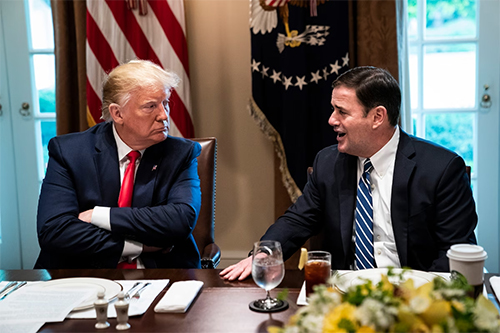
President Donald Trump speaks with Arizona Gov. Doug Ducey (R) as they participate in a working lunch with governors at the White House on June 13, 2019. (Jabin Botsford/The Washington Post)
In a phone call in late 2020, President Donald Trump tried to pressure Arizona Gov. Doug Ducey (R) to overturn the state’s presidential election results, saying that if enough fraudulent votes could be found it would overcome Trump’s narrow loss in Arizona, according to three people familiar with the call.
Trump also repeatedly asked Vice President Mike Pence to call Ducey and prod him to find the evidence to substantiate Trump’s claims of fraud, according to two of these people. Pence called Ducey several times to discuss the election, they said, though he did not follow Trump’s directions to pressure the governor.
The extent of Trump’s efforts to cajole Ducey into helping him stay in power has not before been reported, even as other efforts by Trump’s lawyer and allies to pressure Arizona officials have been made public. Ducey told reporters in December 2020 that he and Trump had spoken, but he declined to disclose the contents of the call then or in the more than two years since. Although he disagreed with Trump about the outcome of the election, Ducey has sought to avoid a public battle with Trump.
Ducey described the “pressure” he was under after Trump’s loss to a prominent Republican donor over a meal in Arizona earlier this year, according to the donor, who like others interviewed for this story spoke on the condition of anonymity to discuss private conversations. The account was confirmed by others aware of the call. Ducey told the donor he was surprised that special counsel Jack Smith’s team had not inquired about his phone calls with Trump and Pence as part of the Justice Department’s investigation into the former president’s attempt to overturn the 2020 election, the donor said.
Ducey did not record the call, people familiar with the matter said.
Now out of public office, the former governor declined through a spokesman to answer specific questions about his interactions with Trump and his administration.
“This is neither new nor is it news to anyone following this issue the last two years,” spokesman Daniel Scarpinato said in a statement. “Governor Ducey defended the results of Arizona’s 2020 election, he certified the election, and he made it clear that the certification provided a trigger for credible complaints backed by evidence to be brought forward. None were ever brought forward. The Governor stands by his action to certify the election and considers the issue to be in the rear view mirror.”
A spokesman for Trump declined to respond to questions about the call with Ducey and instead falsely declared in a statement that “the 2020 Presidential election was rigged and stolen.” The spokesman said Trump should be credited for “doing the right thing — working to make sure that all the fraud was investigated and dealt with.”
It is unclear if Ducey has been contacted by Smith’s office since meeting with the donor. Investigators in the special counsel’s office have asked witnesses about Trump’s calls with governors, including the one to Ducey, according to two people familiar with the matter. It is unclear if prosecutors plan to eventually bring charges or how the calls figure into their investigation. Prosecutors have also shown interest in Trump’s efforts to conscript Pence into helping him, according to witnesses and subpoenas previously reviewed by The Washington Post.
Trump phoned the governor’s cellphone on Nov. 30, 2020, as Ducey was in the middle of signing documents certifying President Biden’s win in the state during a live-streamed video ceremony. Trump’s outreach was immediately clear to those watching. They heard “Hail to the Chief” play on the governor’s ringtone. Ducey pulled his phone from out of his suit jacket, muted the incoming call and put his phone aside. On Dec. 2, he told reporters he spoke to the president after the ceremony, but he declined to fully detail the nature of the conversation. Ducey said the president had “an inquisitive mind” but did not ask the governor to withhold his signature certifying the election results.
But four people familiar with the call said Trump spoke specifically about his shortfall of more than 10,000 votes in Arizona and then espoused a range of false claims that would show he overwhelmingly won the election in the state and encouraged Ducey to study them. At the time, Trump’s attorneys and allies spread false claims to explain his loss, including that voters who had died and noncitizens had cast ballots.
After Trump’s call to Ducey, Trump directed Pence, a former governor who had known Ducey for years, to frequently check in with the governor for any progress on uncovering claims of voting improprieties, according to two people with knowledge of the effort.
Pence was expected to report back his findings and was peppered with conspiracy theories from Trump and his team, the person said. Pence did not pressure Ducey, but told him to please call if he found anything because Trump was looking for evidence, according to those familiar with the calls.
A representative for Pence declined to comment.
In each of the calls, Ducey reiterated that officials in the state had searched for alleged widespread illegal activity and followed up on every lead but had not discovered anything that would have changed the outcome of the election results, according to Ducey’s recounting to the donor.
After learning that Ducey was not being supportive of his claims, Trump grew angry and publicly attacked him.
It is unclear if Ducey and Trump had additional conversations. Publicly, the governor said the state’s election systems should be trusted, even as Trump and his allies sought to reverse his loss.
In Arizona, Trump and his attorney, Rudy Giuliani, called then Speaker of the House Rusty Bowers (R) on Nov. 22, 2020. They asked the speaker to convene the legislature to investigate their unsubstantiated claims of voter fraud, which included that votes had been cast en masse by undocumented immigrants and in the names of deceased people. Weeks later, on Dec. 31, 2020 the White House switchboard left a message for the chair of the Maricopa County Board of Supervisors, Clint Hickman, seeking to connect him with Trump. The supervisor, a Republican, did not return the call.
Trump and his allies made similar appeals to officials in Michigan and Georgia. On Jan. 2, 2021, Trump called Georgia Secretary of State Brad Raffensperger (R) and said he wanted to undo his loss there by finding additional votes. The next night, the White House switchboard left Hickman another voice mail seeking to connect him to Trump. Hickman did not call back.
Investigators with Smith’s office interviewed Raffensperger this week, and they interviewed Giuliani last week. “The appearance was entirely voluntary and conducted in a professional manner,” said Giuliani spokesman Ted Goodman.
More than half a dozen past and current officials in Arizona contacted by Trump or his allies after his defeat have either been interviewed by Smith’s team or have received grand jury subpoenas seeking records, according to four people familiar with the interviews. Those interviewed include Bowers, the former Arizona House speaker, and three current members of the governing board of Maricopa County, the largest voting jurisdiction in the state that affirmed that Biden won.
Spokespeople for Arizona Gov. Katie Hobbs (D) and Arizona Attorney General Kris Mayes (D), told The Post this week that their offices have not received correspondence from Smith’s team seeking records about the 2020 election. The Arizona Secretary of State’s office received a grand jury subpoena dated Nov. 22, 2022, that sought information about communications with Trump, his campaign and his representatives, according to an official familiar with the document but not authorized to publicly speak about it.
During his time as governor, Ducey navigated a hot-and-cold relationship with Trump. Ducey, who struck a more conventional approach to governing, was slow to embrace Trump during his first bid for the White House. The two men warmed to each other, and amid the pandemic and Trump’s second bid for the White House, Ducey campaigned for him.
But after Ducey certified Arizona’s election results, affirming the wins of Biden and other Democrats, Trump ridiculed him on social media: “Why is he rushing to put a Democrat in office, especially when so many horrible things concerning voter fraud are being revealed at the hearing going on right now … What is going on with @dougducey?”
That same day, allies of the president gathered in Phoenix to air unproven claims of widespread fraud and claim that state lawmakers could reject the will of voters. Giuliani attended the event, along with Republican lawmakers and activists; Trump dialed in.
The president invoked Ducey repeatedly in the days that followed, according to an archive of his tweets. On Dec. 3, Trump asked if “allowing a strong check of ballots” in Arizona would “be easier on him and the great State of Arizona.” On Dec. 5, Trump wrote that Ducey and Georgia Gov. Brian Kemp (R) “fight harder against us than do the Radical Left Dems.”
A week later, Trump attacked the men again, asking “Who is a worse governor?” He labeled them “RINO Republicans” and baselessly claimed that “They allowed states that I won easily to be stolen.”
Ducey, long eyed by national Republicans as a formidable candidate for the U.S. Senate, passed on a 2024 bid after his standing with the Trump base cratered after Trump’s attacks. After leaving office in January, he was a fellow at the Sine Institute of Policy & Politics at American University, where he spoke about the policies he enacted while in office. Earlier this month, Ducey announced that he is leading a free-enterprise focused political action committee, Citizens for Free Enterprise.
Jacqueline Alemany contributed to this report.
By Leigh Ann Caldwell
Leigh Ann Caldwell is co-author of The Washington Post’s Early 202 and focuses on Congress and politics. She is also an anchor for Washington Post Live, conducting high-impact newsmaking interviews. Before joining The Post in 2022, Caldwell was a correspondent at NBC News, most recently as a member of its congressional unit. Twitter
By Josh Dawsey
Josh Dawsey is a political enterprise and investigations reporter for The Washington Post. He joined the paper in 2017 and previously covered the White House. Before that, he covered the White House for Politico, and New York City Hall and New Jersey Gov. Chris Christie for the Wall Street Journal. Twitter
By Yvonne Wingett Sanchez
Yvonne Wingett Sanchez writes about voting issues in Arizona for The Washington Post. She previously covered politics for the Arizona Republic. Twitter
*******************
Trump Pressed Arizona Gov. Ducey To Overturn 2020 Election Results, Report Says
by Ty Roush
Forbes Staff
Jul 1, 2023,05:10pm EDT
TOPLINE
President Donald Trump called Gov. Doug Ducey (R-Ariz.) in 2020 to overturn Arizona’s presidential election results, according to the Washington Post, not long before Trump made a similar request to Georgia state officials, which sparked an ongoing criminal probe into Trump’s actions.
KEY FACTS
>> Trump called Ducey in November 2020 to see whether the state would investigate claims of election fraud in the state, unnamed sources told the Washington Post.
>> Trump also requested Vice President Mike Pence to frequently contact and pressure Ducey, who said in December 2020 that Trump had contacted him, though Pence did not follow through on pressuring him.
>> Ducey also told Pence and Trump—who later accused Ducey of “total corruption”—that the state had already investigated claims of election fraud, noting it had not discovered any evidence.
>> Ducey described the call during a Republican donor event earlier this year, according to the Post, adding that Ducey was surprised special counsel Jack Smith had not contacted him about details of the call as part of the Justice Department’s investigation into Trump.
CHIEF CRITIC
A spokesperson for Ducey told the Post that reports about Trump pressuring Ducey to overturn the election “is neither new nor is it news to anyone following this issue the last two years.” The spokesperson added Ducey stands by his decision to certify Arizona’s election results because no “credible complaints” of election fraud were brought forward.
TANGENT
The Fulton County, Georgia, district attorney’s office has been investigating Trump since 2021 for a similar phone call to Secretary of State Brad Raffensperger (R-Ga.), in which Trump asked Raffensberger to “find” votes to overturn the state’s election results. Trump also reportedly pressured other state legislators to decertify the state’s election results. Trump’s legal team previously requested the investigation be thrown out. Fulton County District Attorney Fani Willis said in April she would announce possible criminal charges as a result of the investigation between July 11 and September 1, though it is unclear whether charges will be brought against Trump.
BIG NUMBER
74. That’s how many more electoral college votes President Joe Biden had than Trump in winning the presidency, 306 to 232. Even with Arizona’s 11 votes, combined with Georgia’s 16, Trump would not have won.
KEY BACKGROUND
Ducey—the former CEO of Cold Stone Creamery—served as Arizona’s governor from 2015 to 2023 after first being elected as state treasurer in 2010. He serves as the CEO of the Citizens for Free Enterprise political action committee. Trump trailed President Joe Biden by just under 11,000 votes in Arizona’s 2020 presidential election. Trump and his campaign have repeatedly claimed there was widespread election fraud during the election while calling for results to be overturned, while subsequent legal challenges failed and no evidence has ever emerged. Claims of election fraud in Arizona centered on Maricopa County, in which some Republican legislators—including gubernatorial candidate Kari Lake—falsely claimed ballot results were skewed.
Ty Roush: I cover breaking news for Forbes. Before Forbes, I worked as a reporter for USA Today in Asheville and Black Mountain, North Carolina.
******************************
Trump pressured former Arizona governor to overturn 2020 election results: Trump narrowly lost to Joe Biden in Arizona.
by Rachel Scott, Katherine Faulders, and Lucien Bruggeman
abc news
July 1, 2023, 3:46 PM
Former President Donald Trump attempted to pressure then-Gov. Doug Ducey to overturn the results of the 2020 presidential election in Arizona, according to multiple sources familiar with the matter. The Washington Post first reported the allegations.
Sources also confirm to ABC News that Trump dispatched [ordered] former Vice President Mike Pence to pressure Ducey to find fraudulent votes in the state, and that while Pence did call Ducey multiple times in the aftermath of the election, he did not follow those orders.
Trump narrowly lost Arizona to Joe Biden in November 2020.
No recording of the call was made, sources told ABC News.
A spokesperson for Ducey called this reporting "nothing more than a 'copy and paste' of a compilation of articles from the past two years, disguised as something new."
"Governor Ducey defended the results of Arizona’s 2020 election, he certified the election, and he made it clear that the certification provided a trigger for credible complaints backed by evidence to be brought forward. None were ever brought forward. The Governor stands by his action to certify the election and considers the issue to be in the rear view mirror — it’s time to move on," the spokesperson said in a statement.
Trump's campaign, in response to the reporting, reiterated the former president's view that "the 2020 Presidential election was rigged and stolen," but did not refute the story.
"These witch-hunts are designed to interfere and meddle in the 2024 election in an attempt to prevent President Trump from returning to the White House to make this country great again," the statement from Trump's campaign said.

